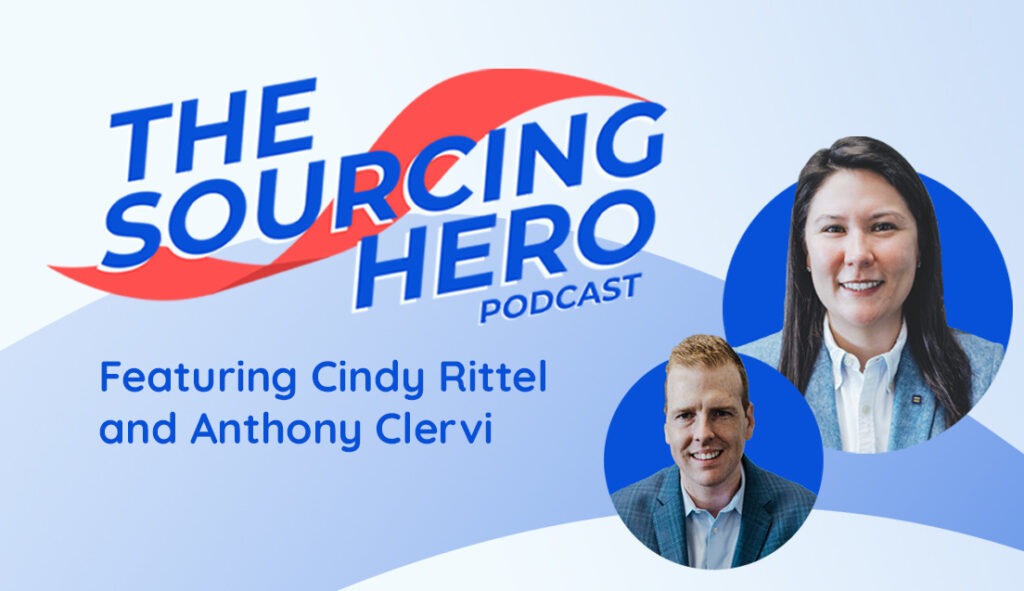Episode 2: A Life of Learning and Transformation
By Katherine McCleery | August 31, 2020
In this episode of The Sourcing Hero, you’ll get to hear from Frank Corris, a 27-year procurement veteran and discoverer of what I’ll call, “The Rubric Revelation.” His insight into how procurement professionals can use a rubric to streamline the RFP/RFI process is sure to bring a welcome “aha moment” for Sourcing Heroes.
Frank shares incredible insight and wisdom for both new and seasoned professionals in sourcing, supply chain, and procurement. This is an episode you won’t want to miss.
Listening Guide
[03:46] The 27-year lesson. Find out one of the most important lessons Frank has learned over the past 27 years.
[06:04] Advice for recent grads. Here’s what to look for in a procurement, sourcing, or a supply chain role.
[07:37] Raising the bar. Expectations within procurement are high regarding cost-savings, but we can accomplish so much more.
[09:56] The rubric revelation. Get ready for an “aha moment” as you learn how a rubric can transform your RFP/RFI process.
[23:38] To bid or not to bid? Sometimes it makes sense to manage a supplier yourself, and sometimes a GPO can save the day.
Highlights
Let the data speak louder than your voice.
In procurement, you should always let the data speak for itself. One of the most important lessons Frank has learned over the past 27 years in procurement is to not respond emotionally or with a great deal of passion. You don’t have to show your position. Take a deep breath. Give yourself time to carefully choose your words and then respond accordingly. Make sure that the data collection and analytics are done right, and then let the numbers speak for themselves.
The evolution of procurement.
Seasoned procurement professionals in the field today didn’t begin with a degree in purchasing. They came up through the ranks, usually with a degree in finance or accounting. That’s not all it takes anymore. Expectations are higher because purchasing is about more than the transaction; it’s about changing the process. That could mean an integration of technology or mapping the current workflow while looking for redundancies and multiple touchpoints. Procurement used to be about finding cost savings. Now, it’s about improving the efficiency of the business.
Pure gold: The rubric-based RFP
A rubric is a tool educators use to grade assignments and tests. It uses a point system to weigh the components of an answer. This same process can be used to assign points to elements within an RFP or RFI. Frank breaks down how the rubric concept not only simplified, but expedited the entire RFP process, and it can do the same for you. Tune in at 09:56 to learn how it’s done, as well as his two-step process to pre-qualify and evaluate potential vendors. You’ll want to take notes!
Is a degree enough?
Until recently, no one offered a degree in purchasing. Those who entered the field either came up through the ranks or were good with numbers. That’s not all it takes anymore. Now, students can pursue a degree in supply chain, but the core curriculum isn’t much different than a business degree. You’ll get the basics of business and business law and about six or seven classes in your specialty, making it hard to get everything you need. This is why a mentor is so important.
Mentorship is a gift that keeps on giving.
A mentorship early on in Frank’s career still benefits him today. The ability to ask yourself, “what would my mentor do?” and have an example to look to is invaluable. A mentor is someone who sees something in you and helps you learn how to be better. To find a mentor, be observant. Find somebody that can help you. He explains that the important thing is to never stop learning.
Mentions
Host: Katherine McCleery, Head of Marketing
Special Guest: Frank Corris, CEO, Corris Consulting Group



